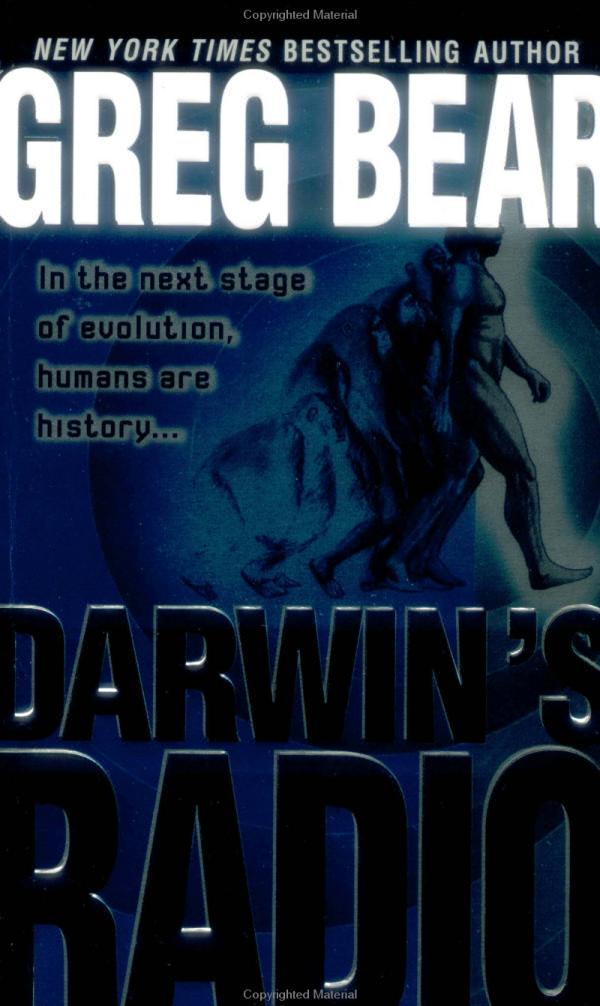 Darwin's Radio
Darwin's Radio

Greg
Bear
writes what most people would call "Hard Sci-Fi."
That is, his characters and plots revolve around scenarios and technology that,
while perhaps not common or available, are at least plausible, given what we
know.
Darwin's radio, published in 2000, is typical of his work, and with few faults, does a good job of postulating a slightly alternate method of evolution. Since the book was based on ongoing research studied by Bear, I guess it's not suprising that a new article in New Scientist is touting that the mechanism that Bear's book is centered on may have some basis in fact. Read on for more information..
Darwin's radio, published in 2000, is typical of his work, and with few faults, does a good job of postulating a slightly alternate method of evolution. Since the book was based on ongoing research studied by Bear, I guess it's not suprising that a new article in New Scientist is touting that the mechanism that Bear's book is centered on may have some basis in fact. Read on for more information..
Now granted, the article in
New
Scientist doesn't involve the next step in
evolution for humans as does Darwin's
Radio, but the process described is very close
to that of the book. it goes something like this:
Instead of evolution being a series continuously-expressed set of mutations to a great number of individuals, these mutated genes are essentially "bottled-up" - they are kept in check by the body using an as-yet-unknown process. This process can break down, however, in the presence of certain environmental factors which stress the individual. When the mutations are released, they begin expressing themselves in the genotype, resulting in rapid change for a group of individuals.
Of course, not all of the mutations are beneficials. In fact, most are harmful. However, some of the mutations may confer upon an individual an advantage that may allow them to survive. Bang. Evolution has occurred.
Now, all this new-fangled stuff doesn't preclude the more pedestrian form of evolution described in books such as The Beak of the Finch. Nevertheless, it may provide some insight into the overall picture of how we all came to be.
In Bear's book, the story revolves around the discovery of a new viral disease that is sexually-transmitted, but only affects women. These infected women who give birth have their children die. It turns out, however, that these children are actually the next step in human evolution. I won't spoil the whole thing, but the viral "disease" is actually a trigger that forces the mutations already present in the human gene sequence to begin expressing themselves.
If this stuff interests you, definitely check out the book. You won't be disappointed.
Instead of evolution being a series continuously-expressed set of mutations to a great number of individuals, these mutated genes are essentially "bottled-up" - they are kept in check by the body using an as-yet-unknown process. This process can break down, however, in the presence of certain environmental factors which stress the individual. When the mutations are released, they begin expressing themselves in the genotype, resulting in rapid change for a group of individuals.
Of course, not all of the mutations are beneficials. In fact, most are harmful. However, some of the mutations may confer upon an individual an advantage that may allow them to survive. Bang. Evolution has occurred.
Now, all this new-fangled stuff doesn't preclude the more pedestrian form of evolution described in books such as The Beak of the Finch. Nevertheless, it may provide some insight into the overall picture of how we all came to be.
In Bear's book, the story revolves around the discovery of a new viral disease that is sexually-transmitted, but only affects women. These infected women who give birth have their children die. It turns out, however, that these children are actually the next step in human evolution. I won't spoil the whole thing, but the viral "disease" is actually a trigger that forces the mutations already present in the human gene sequence to begin expressing themselves.
If this stuff interests you, definitely check out the book. You won't be disappointed.
Posted: Fri - September 27, 2002 at 09:26 AM
Quick Links
Every normal man must be tempted at times to spit on his hands, hoist the black flag, and begin slitting throats.
- H.L. Mencken
Calendar
| Sun | Mon | Tue | Wed | Thu | Fri | Sat |
Categories
Archives
PHOTO ALBUMS
The Photo Galleries are offline at the moment. I've moved the site to a new provider and haven't had time to set them up.
OS X Software
Windows Software
Miscellaneous Stuff
RSS Feed